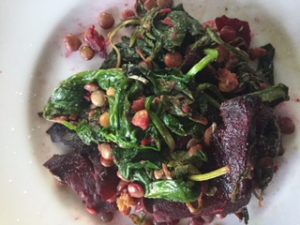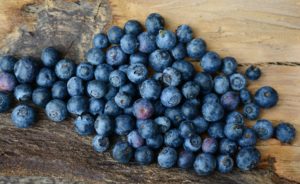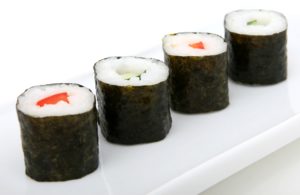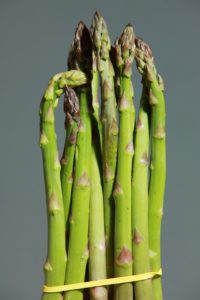Why I Don’t Like the Ketogenic Diet and Why You Need to Eat Your Carbs!
(especially if you have a mental health issue!)
I am sure I will get some flack for not supporting the ketogenic diet. In fact, there are others in the health and nutrition field that follow a keto diet and recommend it across the board to all their clients. I am not in this camp.
A keto diet short term can aid in weight loss and can be useful, but I don’t suggest using it for more than 3 months unless it is for a health issue that has shown some benefit such as for seizures, because it can be a very limiting diet since you can eat only 20 carb grams daily (40 grams on high intensity exercise days).
What I have found, is that without these nutritious whole prebiotic rich foods, you may be upsetting the gut microbiome.
What I recommend instead is a low processed carb diet. Get the bread, pasta, daily wine or beer, pretzels, chips, pizza, frozen meals and so forth out of the diet and focus on whole food carbs.
I used to think like many others, that beans and legumes in the diet were unhealthy, too high in carbs and impact blood sugar and weight. In fact, when I was in nutrition school and other students brought in foods for us to sample I would not eat the foods with beans and legumes. I thought still at that point that they should be avoided. I was so wrong!
The more I researched this, the more results I found to NOT support my beliefs. Healthy fiber rich carbs can be a useful tool for weight loss and blood sugar regulation. They are critical for gut health, which is where your immune system is and is called your second brain. Wouldn’t you want to support gut health?
Most ancient cultures had some beans and legumes in their diet along with tubers and other fiber rich whole foods and did not show signs of modern diseases such as diabetes, heart disease and high blood pressure.
There are three different types of prebiotics from whole foods that are good for your health. They are resistant starch, Fructooligosaccarides, and Inulin.
The Difference Between Prebiotics and Probiotics
Probiotics are from fermented foods and you are essentially consuming the live bacteria in these foods to colonize your gut with many different strains of good bacteria. Probiotics come from fermented foods with live cultures/bacteria such as miso, kimchee, kefir, kombucha, raw, unfiltered apple cider vinegar and raw fermented vegetables. You can find theses foods in the refrigerator section of your natural food store and you can also make your own.
Prebiotics are the foods for the bacteria. Just like you need healthy food to thrive your gut bacteria need high quality food as well to thrive, to grow and maintain healthy conditions.
Think of these prebiotic fibers from your whole food carbs as food for the good bacteria in your gut. Each different fiber rich carb that you eat provides a prebiotic meal for different gut bacteria. Thus, the reason for not eating the same whole food carb every night but eating a variety so that you have fuel for different strains of gut bacteria.
Resistant Starch (RS), Fructooligosaccarides (FOS) and Inulin
Foods containing RS are considered prebiotic rich foods. These are different than probiotics. Probiotic rich foods are fermented foods such as miso, kimchee, kefir, fermented vegetables and kombucha.
Resistant Starch (RS) is a starch found in your whole food carbs that isn’t fully broken down and instead will turn into short chain fatty acids by your gut bacteria. While that may sound gross, it is actually a very healthy process for you. Short chain fatty acids will support your gut function, heal a leaky gut and supports hormone secretions in the gut.
Foods that contain RS are foods that are high in amylose. Amylose is a polysaccharide that is a straight chain, meaning it has limited amount of surface area exposed for digestion. These foods digest more slowly and thus you have less risk of blood sugar spikes.
On the other hand, foods that are higher in amylopectin, a branched chain, get broken down quickly. Meaning it rises blood sugar faster and higher. Think processed carbs such as bread, bagels and pasta.
RS is not fully absorbed in the small intestine and the RS makes its way down to your colon where your gut bacteria ferments the RS. Once it is fermented, it created short chain fatty acids that can either be absorbed by your body from the colon or stay in the large intestine and can be used by your bacteria for energy.
In the US and other developed countries, we consume about 3-9 grams of RS per day. In ancient cultures and in developing countries, the RS consumption is much higher, somewhere around 30-40 grams per day.
To reap these benefits, choose whole food carbs such as whole grains (not pasta and bread), fruits, veggies, beans and legumes.
FOS are sugars that occur naturally in foods such as onion, chicory, garlic, asparagus, banana and artichoke for example.
Just like with RS, these make their way down to the colon for your good bacteria to feed on and are considered prebiotics.
FOS can also increase calcium absorption in the body. Most people can tolerate 20-30 grams of FOS per day. Go slow if these are new foods to your diet as you may have digestive issues early on.
Inulin is another type of prebiotic rich fiber and is found in foods such as onions, leeks, garlic, asparagus, and Jerusalem artichoke. Inulin is also converted into short chain fatty acids. Ten to 20 grams of inulin can be beneficial but if you follow a low FODMAP diet, you may have difficulty digesting inulin along with RS and FOS.
Benefits of Prebiotic Starches
- Can aid in weight loss and maintenance
- Aid in lowering cholesterol
- Feel full and satisfied, not craving more carbs
- Helps to regulate blood sugar
- Improves digestion (may be useful in IBS, diverticulitis, constipation and ulcerative colitis)
- Supports immune function
- Can slow down the progression of chronic kidney disease
- Improve intestinal permeability
- Can be used for chronic diarrhea
- Reduces inflammation
- Supports a healthy immune system
- Increases nutrient absorption
- Affects brain function (may increase dopamine, reduce anxiety and depression)
Note: I never recommend a low carb diet for my clients with mental health issues (especially depression). Serotonin and tryptophan production is triggered by whole food carbs. Thus going too low such as in a ketogenic diet can induce depression or make you feel worse.
What Foods to Add into the Diet
- Asparagus raw or lightly steamed (inulin and FOS)
- Unripe banana (RS)
- Buckwheat groats (RS) cool after cooking
- Cabbage: raw or as sauerkraut (FOS)
- Chickpeas (RS) soak dried (canned have lower RS levels)
- Dandelion greens (inulin) eat raw
- Fennel (FOS) eat raw
- Garlic (Inulin, FOS) raw
- Jerusalem Artichoke (inulin and FOS) eat raw in salad or roast
- Lentils (RS)
- Oats (steel cut) (RS)
- Onion and shallots (Inulin and FOS) raw or lightly cooked
- Pistachios (FOS)
- Potato (RS) boil and allow to cool
- Radicchio (FOS inulin) Raw
- Watermelon (FOS)
- Black beans, navy beans, northern beans, black eyes peas (RS)
- Lima beans (RS)
- Sushi rice (RS)
- Brown rice (RS)
- Peas (RS)
- Blueberry (FOS)
- Pear (FOS)
- Nectarine (FOS)
Note: fruit tend to have lower amounts of prebiotics as opposed to vegetables
What May Happen When You Start to Add in Prebiotic Rich Carbs
Your gut may rebel at first. Maybe your gut is in bad shape currently. Suddenly you bring in all these “good guys” and the negative bacteria may rebel and essentially try to fight it out before they die off.
When this happens you may experience gas, bloating and some stomach cramping at first but should pass as your body adjust to the new terrain. Think of it this way-you are going to paint a room because the paint is marked, chipped, etc. It looks a mess. During the process of painting, everything is chaos. The furniture is moved and covered up, tape on the walls, and plastic on the floor. It basically looks a mess. But afterwards the room looks great. This is the process that will go on with your gut when you start to add in these prebiotic rich foods.
If these foods continue to bother you or your symptoms get worse, you may have something called SIBO and may want to look further into this and get tested.
Bottom Line: Don’t worry about gram amount of these prebiotic rich foods. Instead slowly add in these foods to your diet. Make whole carb rich foods a part of your daily meals and snacks. Swap them out for the processed and refined carbs in your diet such as French fries, potato chips and other unhealthy and nutrient deficient foods.
Sources
https://experiencelife.com/article/16-prebiotic-foods-to-eat-now/
https://www.ncbi.nlm.nih.gov/pubmed/20119826
https://www.sciencedaily.com/releases/2013/07/130716115728.htm
https://academic/oup.com/jn/article/136/1/70/4664170
https://articles.mercola.com/sites/articles/archive/2016/03/07/inulin-health-benefits.aspx
https://www.sciencedaily.com/releases/2005/11/051114220938.htm






Leave A Comment
You must be logged in to post a comment.